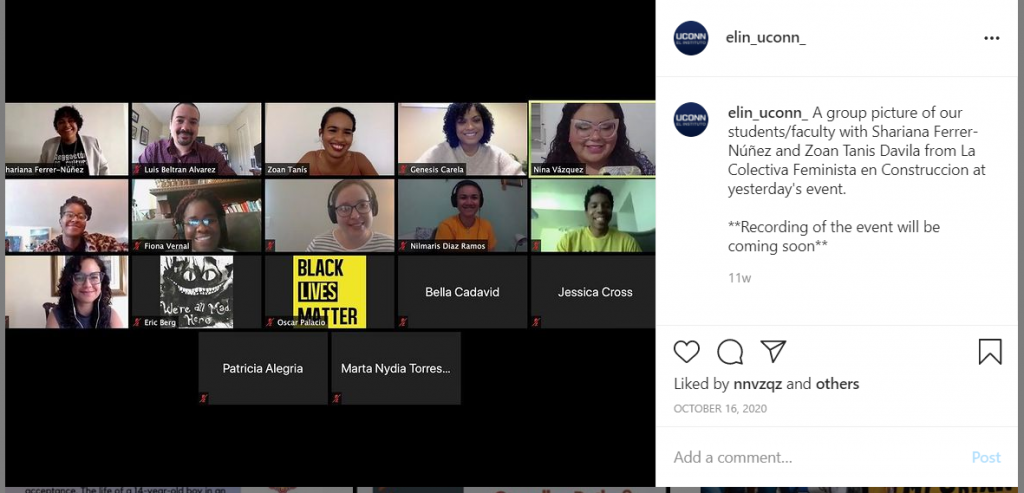Contributed by Alonso Velásquez
El Instituto graduate students Nina Vásquez and Génesis Carela, together with UConn Political Science doctoral student Luis Beltrán-Alvarez and University of Oregon Philosophy doctoral student Rosa O’Connor-Acevedo, organized a virtual event on December 15, 2020, “Whose Heritage? What Heritage? Caribbean Black and Decolonial Feminist Confrontations against White and Heteropatriarchal Supremacies.” This event featured talks by Zoán Dávila-Roldán and Shariana Ferrer Núñez, two leaders of Puerto Rico’s pathbreaking Colectiva Feminista en Construcción. La Colectiva is a grassroots organization founded on Afro-feminist liberation, which advances struggles against heteropatriarchy and anti-Blackness on the island. Dávila and Ferrer were initially scheduled to visit UCONN for an extensive set of community-facing events in late March but these plans were abandoned in the early days of the pandemic shutdown. The Black Lives Matter justice mobilizations of 2020 gave added urgency to la Colectiva’s agenda. The presenters spoke from the island, focusing on black feminism, LGBTQIA rights, Women’s rights and the intersections of race, capitalism, and patriarchy.
In talking about the history of Puerto Rico, Dávila explored the theme of “Hispanidad,” forwarding an argument that the Spanish language and culture are colonial impositions, and that identitary constructs such as Hispanic, Latino or Latinx are all products of political violence. Race and patriarchy are the central axes of the colonial capitalist power structure. “Mestizaje” (racial mixture) functions similarly as a concept through which Puerto Ricans can ignore the racism behind anti-Black state policies, such as “Mano Dura” policing during the 1990s. Mano Dura exemplifies as well the use of Puerto Rico as a testing ground for policies later implemented on the mainland. Puerto Rico also has become the second largest housing authority in the US after New York City, with poor Black mothers among the most impacted. Dávila said that Black Puerto Rican lives only matter to island elites when and insofar as this helps elites sustain a neoliberal economic order imposed by the United States.
Ferrer Núñez said that Puerto Ricans should reexamine and question their culture, like their language, flag, and anthem. She said that Puerto Ricans must connect again with the heritages of their ancestors. Seeing how much of culture has been formed by colonization, she talked about how individuals could try to form their own identity. She pointed to reggaetón as a symbol of music produced by and for the people.
The speakers view the pandemic as an issue manipulated by island politicians to inspire fear among the public and further isolate ordinary citizens from each other. Sensible limits on physical proximity only heighten the need to reach out and stay connected with others.
